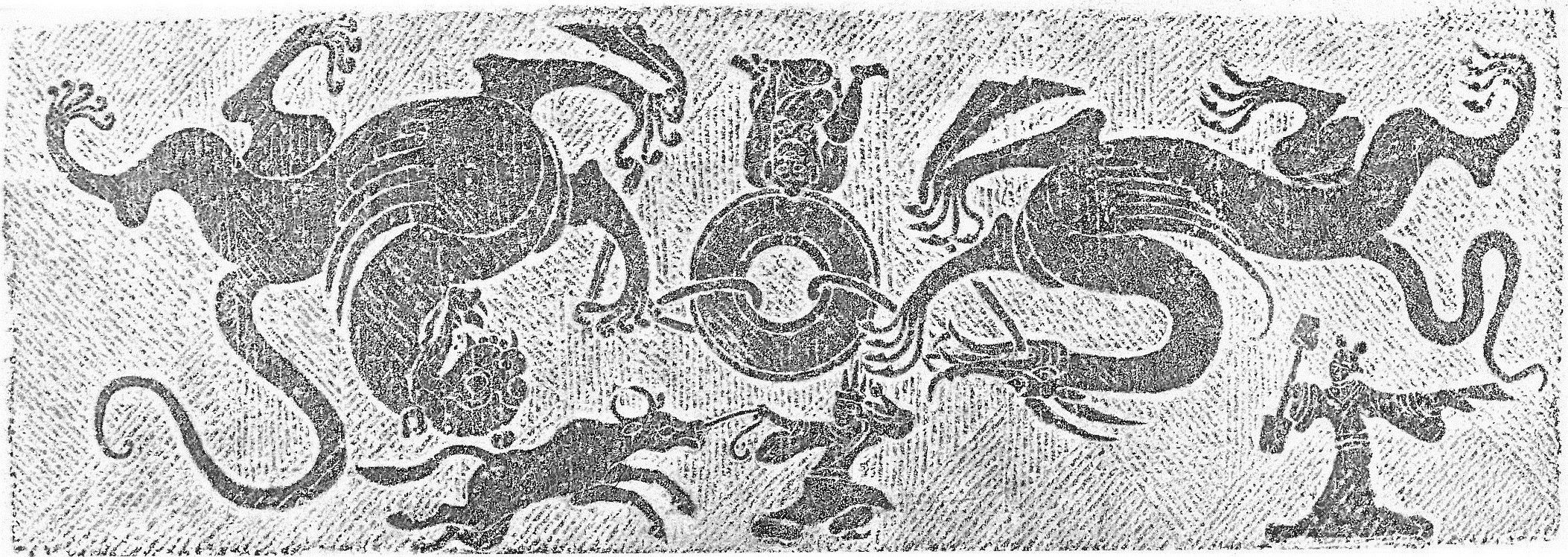"Cowherd (niulang 牛郎) and Weavermaid (zhinü 織女)" is a famous tale in ancient China.
Both are starry constellations that are first mentioned in the Classic Shijing 詩經. They are also mentioned in one of the Han period 漢 (206 BCE-220 CE) poem collection Gushi shjiu shou 古詩十九首.
The earliest book in which story of the two persons is narrated, is the story collection Xiaoshuo 小說 by Yin Yun 殷芸 (471-529) from the Liang period 梁 (502-557) , where it is said that east of the Milky Way (tianhe 天河 or Han 漢) lived the waivermaid, a daughter of the Heavenly Emperor 天帝, who all through the year uses to produce clothes. When she was finished with this task, she married the cowherd (niulang or qianniulang 牽牛郎, shortly called qianniu 牽牛), who lived west of the Milky Way. After her marriage she gave up her original business, which made the Heavenly Emperor so enraged that he forced her to continue weaving clothes and only allowed her meeting her husband once a year.
 |
Rubbing of a cover of a stone coffin (see relief stones) from the Han period, showing a dragon and a tiger (here displayed top-down) playing with a jade disk (bi 璧, supported from below by a strongman), and, in smaller scale and mirrored horizontally, the Cowherd and the Weavermaid. The latter carries a spindle in her hand. 69 × 227 cm. Unearthed in Xinjin 新津, Sichuan, and kept in the Museum of Sichuan University (Sichuan Daxue Bowuguan 四川大學博物館). Source: Zhongguo meishu quanji bianji weiyuanhui 《中國美術全集》編輯委員會, ed. (1993). Zhongguo meishu quanji 中國美術全集, Huihua bian 繪畫編, Vol. 18, Huaxiangshi huaxiangzhuan 畫像石畫像磚 (Shanghai: Shanghai renmin meishu chubanshe), no. 90. |
A popular tale says that the cowherd was a poor boy living on earth who won the love of the weavermaid. Hated by his own brothers, he was left an old cow and a small hut to live in. The two children of the couple were a boy and a girl. Their business was, as that of all peasants in China, to plough the earth (man) and to weave clothes (woman). The Heavenly Emperor abducted the weavermaid and did not allow her to meet her husband again. Only when the old cow died, the cowherd used its skin to ascend to Heaven, where he was to be reunited with his beloved wife, but only for one time each year, which was on the seventh day of the seventh lunar month. This day is called in Chinese qixi 七夕 "eve of the seventh".